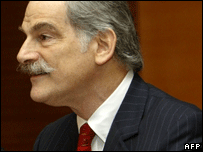|
Analysis
By Jorn Madslien
Business reporter, BBC News
|

The robustness of Turkey's economy, which has staged an impressive recovery since the country's 2000-1 financial crisis, faced its toughest test yet earlier this year.
Both the lira and the stock market took a tumble as investors began doubting the government's commitment to both secularism and financial reform.

Investors were concerned about Turkey's commitment to secularism
|
It was a short-lived upset, and though investors remain wary, there has been a gradual return to the Turkish market.
"The Turkish economy has shown considerable resilience in the wake of the financial markets' turbulence earlier this year," according to a recent International Monetary Fund (IMF) report.
"Domestic demand has slowed, but by less than expected, and there are signs of an upturn in exports that is helping to sustain output."
Falling inflation
Economic growth is seen as vital in order that Turkey can rise to a level where it can join the European Union on a par with existing members.
 |
Facts and figures about potential EU member Turkey

|
True, economic growth has slipped this year to an expected 6%, from 7% last year, and the economic output per head remains at less than a third of the EU average.
But Turkey's GDP per head is not much lower than that in Romania, which is about to become an EU member.
Besides, the rates of both unemployment and inflation in Turkey have fallen to high single-digit figures - quite an achievement, given that it is only five years since Turkey had an inflation rate of 70%.
And there is no lack of optimism for the future.
Earlier this week, Central Bank President Durmus Yilmaz said Turkey's rate of inflation should fall below 5.2%, perhaps as far as 1.7%, by 2008.
Excessive spending?
Yet in the short term, inflation worries remain, the IMF points out.
Early this year, the Central Bank predicted a drop to 5% by year-end. Now it warns the rate could climb back into double digits.

IMF's John Lipsky warns against excessive spending
|
As such, "inflation remains above the target path", warns the IMF, as it urges the government to curb spending and the Central Bank to resist any urges to reduce interest rates.
And while the Bank appears to be all ears, with Mr Yilmaz having already raised interest rates sharply to stabilise the lira and vowed to tighten monetary policy further if inflation gallops out of control, the government appears less disciplined.
Two weeks ago, the government announced plans for a 17% increase in its 2007 budget, sparking accusations of irresponsible populist spending ahead of next year's presidential and general elections.
"Financial markets are showing greater sensitivity to countries like Turkey that have high debt levels, a widening current deficit and are subject to inflationary pressures," observes John Lipsky, IMF first deputy managing director.
"In this context, it is only natural that financial markets will be paying particular attention to whether fiscal discipline is maintained in the run-up to next year's elections."
The IMF, currently considering whether to release the next tranche of a $10bn loan arrangement, stresses that Turkey must step up the fight to hold down inflation.
It wants Turkey to "strengthen tax administration, reform the tax regime, prepare for next year's launch of the new pension and health insurance systems, and reform the financial sector".
But Turkey has also come a long way in many areas.
Government debt as a proportion of GDP has fallen sharply since 2001 and is set to fall further, as an extensive privatisation programme is going ahead nicely.
Foreign investors are diving into a range of sectors, from telecoms to steel to banking, with land reform expected soon.
Which all adds up to one point only: it is getting harder for those opposed to Turkey's EU membership ambition to rely on economic arguments in an effort to block its entry.
|




Bookmark with:
What are these?